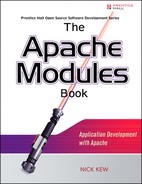Footnotes
Chapter 1
[1] http://subversion.tigris.org/
[2] This is a much-misunderstood topic. The GPL is a great deal less restrictive than it is often portrayed in the media. For details, see http://www.fsf.org/licensing/.
[3] This discussion refers to GPL version 2 (1991). Version 3 is currently in preparation, and a draft has been posted for discussion. It appears likely that it will be possible to distribute Apache software under version 3 of the GPL, but not the reverse.
[4] http://www.fsf.org/licensing/licenses/index_html#GPLIncompatibleLicenses
[7] See Chapter 11 for details.
[8] SCO’s main lawsuits are against UNIX and Linux developer IBM and former UNIX owner Novell, not end users. One of its two suits against Linux users (Daimler-Chrysler) has already been thrown out of court; the other (Autozone) is on hold pending the outcome of the IBM and Novell cases.
[9] Starting in 1999, end users have paid tens of millions of dollars to Timeline, Inc., for patent infringements in Microsoft’s SQL Server. Microsoft had licensed the patents for its own internal use but the license did not to extend to users of the software, according to a final court judgment in February 2003.
[10] In 2005, Microsoft PR made a very public commitment to indemnify users against intellectual property lawsuits. Nevertheless, in January 2006, lawsuits over patent infringement in Microsoft DRM were filed by Softvault against Yahoo!, Microsoft, Napster, Creative Labs, Dell, Gateway, Iriver, Samsung, Toshiba, Digital Networks, Palm, Audiovox, Sandisk, and Thomson (http://www.theinquirer.net/?article=28990).
Chapter 2
[1] Here and elsewhere in this book, terms such as “UNIX-family” imply both UNIX itself and other POSIX-centered operating systems such as Linux and MacOSX.
[2] MPMs are not necessarily tied to an operating system (most systems have some kind of POSIX support and might be able to use it to run Prefork, for instance). But if you try to build Apache with a “foreign” MPM, you’re on your own!
[3] This depends on the platform. On Linux versions without NPTL, Prefork is commonly reported to be as fast as Worker. On Solaris, Worker is reported to be much faster than Prefork. Your mileage may vary.
[5] http://www.telana.com/peruser.php
[6] http://websupport.sk/~stanojr/projects/mod_ruid/
[7] http://fastcgi.coremail.cn/
[8] Mass virtual hosting configurations use a single server_rec for all vhosts, which is why they don’t have the flexibility of normal vhosts.
[9] http://apache.webthing.com/mod_proxy_html/
[10] http://www.outoforder.cc/projects/apache/mod_transform
[11] http://apache.webthing.com/xmlns.html
[13] http://apache.webthing.com/
Chapter 3
[2] http://svn.webdav.org/repos/projects/serf/trunk
[3] http://apvfs.sourceforge.net/
[4] http://apache.webthing.com/database/
[5] http://dev.ariel-networks.com/apr/apr-tutorial/html/apr-tutorial.html
Chapter 4
[1] http://raburton.lunarpages.com/apache/mod_auth_cookie/
[2] http://www.danga.com/memcached/
[3] http://www.apachetutor.org/security/
[4] http://www.modsecurity.org/
[5] Usually Windows machines where a virus enables the attacker to take control on demand.
[6] http://www.nuclearelephant.com/projects/mod_evasive/
[8] http://force-elite.com/~chip/archives/mod_load_average-0.1.0-test3.tar.bz2
[9] http://apache.webthing.com/svn/apache/misc/mod_robots.c
[10] This is strongly discouraged!
[11] http://httpd.apache.org/docs/2.2/suexec.html
[12] This is partially, but not entirely, solved in the higher-level gd library.
[13] http://marc.theaimsgroup.com/?1=php-dev&m=108258335530060&w=2
Chapter 5
[1] http://CGI-Spec.Golux.Com/
[2] Chapter 10 explains the meaning of registering the function with a hook.
[3] http://apache.webthing.com/mod_upload/
Chapter 6
[1] mod_negotiation also uses APR_HOOK_FIRST, so we’d also have to hook mod_choices explicitly ahead of it to combine the two. See the discussion of hooks in Chapter 10.
Chapter 7
[1] http://www.outoforder.cc/projects/apache/mod_gnutls/
[2] http://www.modsecurity.org/
Chapter 8
[3] http://apache.webthing.com/mod_line_edit/
[4] Since this passage was written, a module mod_expat has been developed that makes buckets of SAX events. But that module takes a different approach: The buckets are passed down the chain for another filter to interpret. mod_expat can be found at http://www.heute-morgen.de/modules/mod_expat/.
Chapter 9
[1] https://ssl.bulix.org/projects/rici/browser/apache/mod_comment.c
[2] http://www.coelho.net/mod_macro/
Chapter 10
Chapter 11
[1] This description applies to simple CGI, as implemented by Apache’s mod_cgi. Other CGI implementations, such as fastcgi, provide workarounds for this problem.
[2] http://libdbi.sourceforge.net/
[3] http://apache.webthing.com/xmlns/
[4] Since this chapter was written, a similar but improved and up-to-date module mod_sqil has been developed (http://www.heute-morgen.de/modules/mod_sqil/).
[5] This is as originally written for MySQL 4.1. The current driver has some conditional sections (omitted for brevity here) to support differences in MySQL 5.
Chapter 12
[1] http://apache.webthing.com/mod_proxy_html/
